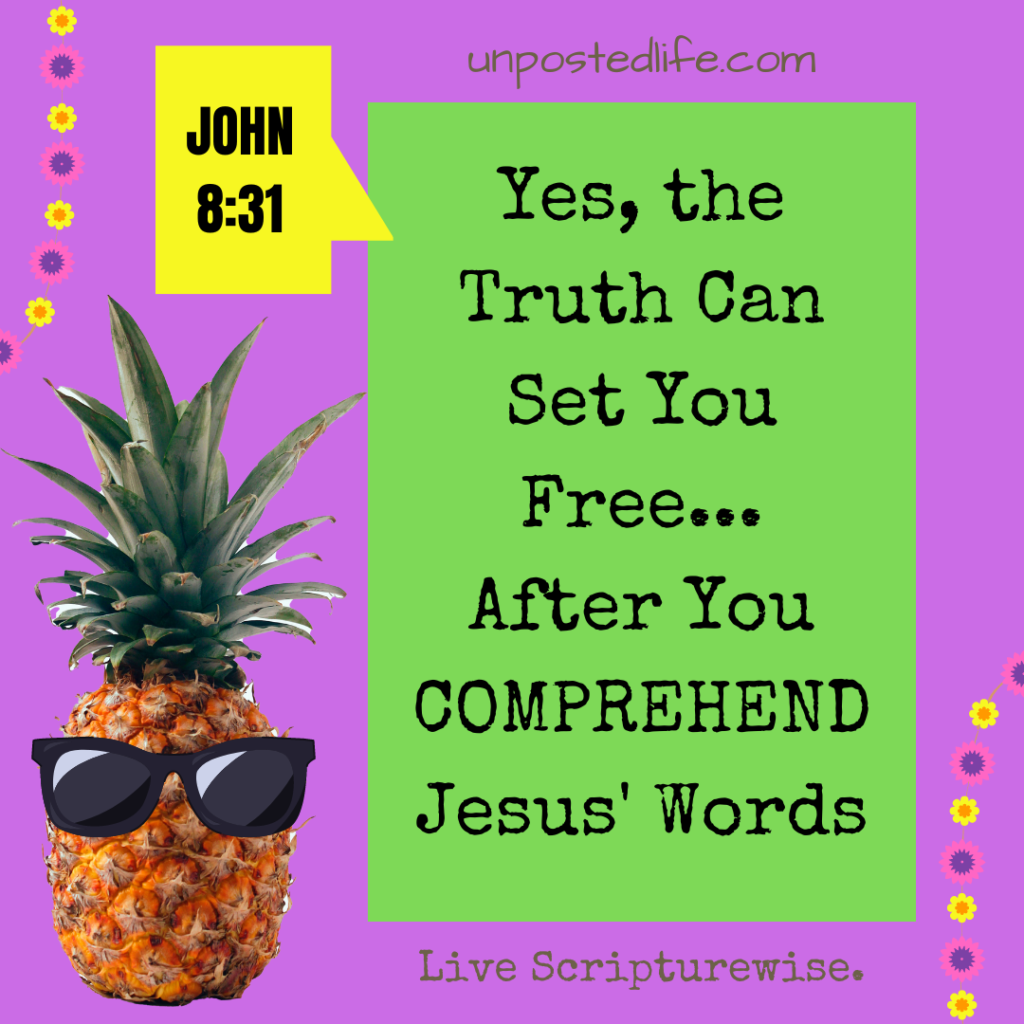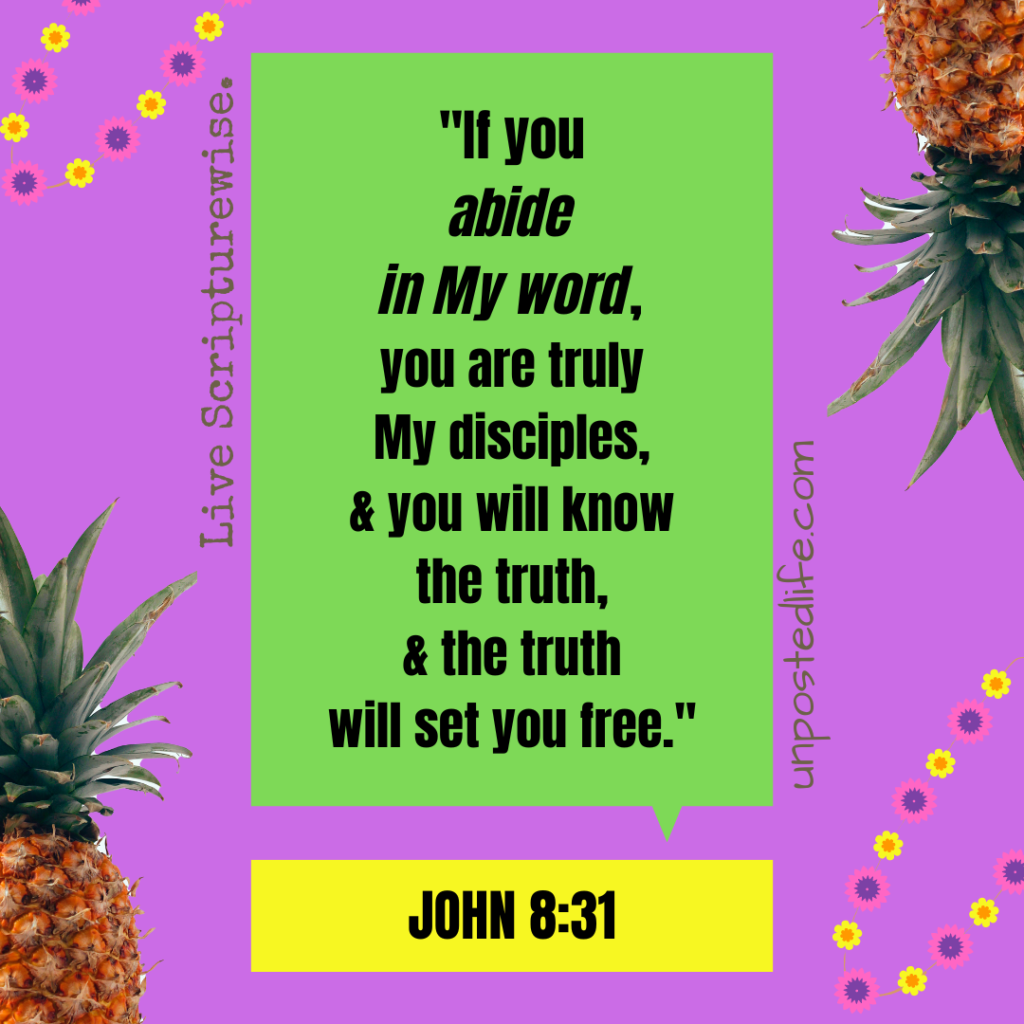“So Jesus said to the Jews who had believed Him, ‘If you abide in My word, you are truly My disciples, and you will know the truth, and the truth will set you free.'”
John 8:31 (ESV)

Six Summer Weeks in John
Week 3, Day 17:
John 8:1-59 (Part II)
In the last post,
Yes, the Truth Can Set You Free… but First You Must Slow Down & Read Carefully,
I shared that I had recently been reminded of the benefits of slowing down, reading Scripture more carefully, and not living life in “hurry” mode. After all, Jesus didn’t hurry, and He had every right & reason to: only three years to save the world and teach His disciples what they needed to know!
Today we’re going to slow down & look at some comprehension basics for John 8:12-59: the 5 W’s & an H. Through this simple process Scripture can become amazingly clear!
*For more Six Summer Weeks in John posts, click here.
5 W’s and an H
The who, what, when, where, why, and how of John 8:12-59 will enable us to comprehend the passage as Jen Wilkin (quoted in my previous post) defines it:
“Comprehension… seeks purposefully to discover what the original author intended me to notice or ask.”
Women of the Word, p.89, 2014
Here we go!
*To read all of John 8:12-59 in the NLT, ESV, or NIV, click here.
Who, What, When, Where, Why, & How
You may think it strange that I don’t address the 5 W’s & an H in the order you see above. I have arranged them in the way I believe achieves the best flow for the comprehension of this passage. So, let’s start with…
What?
“Again Jesus spoke…”
John 8:12 (ESV)
The main what going on in these verses, and throughout all the Gospels, is Jesus speaking. Go back to the end of John 6 to see what Jesus said about His words.
“When many of His disciples heard it [Jesus’ words], they said, ‘This is a hard saying; who can listen to it?’ 61But Jesus, knowing in Himself that His disciples were grumbling about this, said to them, ‘Do you take offense at this? 62Then what if you were to see the Son of Man ascending to where He was before?
63It is the Spirit who gives life; the flesh is no help at all. The words that I have spoken to you are spirit and life. 64But there are some of you who do not believe.’ (For Jesus knew from the beginning who those were who did not believe, and who it was who would betray Him.) 65And He said, ‘This is why I told you that no one can come to Me unless it is granted him by the Father.’
66After this many of His disciples turned back and no longer walked with Him. 67So Jesus said to the twelve, ‘Do you want to go away as well?’ 68Simon Peter answered Him, ‘Lord, to whom shall we go? You have the words of eternal life, 69and we have believed, and have come to know, that You are the Holy One of God.’
70Jesus answered them, ‘Did I not choose you, the twelve? And yet one of you is a devil.’ 71He spoke of Judas the son of Simon Iscariot, for he, one of the twelve, was going to betray Him.”
John 6:60-71 (ESV)
Can we first acknowledge that Jesus was not trying to win friends and make converts at all costs? Quite the opposite! Jesus said hard things, things that offended His own followers, many of whom “turned back and no longer walked with Him” because of it. Jesus did not sacrifice truth to avoid offending people whether they were followers, enemies, family, or His closest friends.
Jesus did not sacrifice truth to avoid offending people whether they were followers, enemies, family, or His closest friends.
How could Jesus have this attitude? “This is why I told you that no one can come to Me unless it is granted him by the Father,” (John 6:65). Jesus completely trusted the Father with this, with people and whether they would follow Him or not. Why don’t we learn to, too? It sure makes for a less stressful life!
Now, back to our question: What?
Jesus says in John 6:63 “The words that I have spoken to you are spirit and life.” The ESV Study Bible comments that “those words are spirit and life in the sense that they work in the unseen spiritual realm and awaken genuine spiritual life,” (p.2036; 2008, 2016 text edition). Jesus’ words work in ways we can’t always see, but their work is more real (actually life-giving!) than any work we can do in the flesh.
What? Jesus is speaking words that are spirit & life.
Where?
Verses 20 & 59 inform us where John 8:12-59 takes place.
“These words He (Jesus) spoke in the treasury, as He taught in the temple; but no one arrested Him, because His hour had not yet come.”
John 8:20 (ESV)
“So they picked up stones to throw at Him, but Jesus hid Himself and went out of the temple.”
John 8:59 (ESV)
The words & events of John 8:12-59 take place in the Temple, specifically in the area known as the treasury (which some believe is part of the Court of the Women).
Where? In Jerusalem, in the Temple, in the treasury area
When?
John 8 does not give us an exact when; however, Ch. 7 tells us Jesus was in Jerusalem for the Feast of Booths (Tabernacles, a.k.a. Sukkot).
“2Now the Jews’ Feast of Booths was at hand…
14About the middle of the feast Jesus went up into the temple and began teaching…
37On the last day of the feast, the great day, Jesus stood up and cried out, ‘If anyone thirsts, let him come to Me and drink…'”
John 7:2,14,37 (ESV)
John 8:12-59 seems to take place not long after the Feast of Booths (Tabernacles, a.k.a. Sukkot), but we aren’t told exactly how long after. It may even be immediately after or even at the end. John 8:12 merely says “Again Jesus spoke to them…”
The Feast of Booths happened in the fall, September/October for us, the 15th-22nd of the seventh Jewish month, Tishri. (This year, 2022, the feast will begin the evening of Sunday, Oct. 9, and end the evening of Oct. 16.) To learn more about this feast, you can read Leviticus 23:33-36,39-43 (here).
*The ESV Study Bible, p.247, 2008, 2016 text edition
The next feast is mentioned in John 10:22.
“At that time the Feast of Dedication took place at Jerusalem. It was winter…”
John 10:22 (ESV)
Therefore, John 8:12-59 happened at or after the fall Feast of Booths and before the winter Feast of Dedication.
When? At the end or just after the Feast of Booths (Tabernacles) in Sept./Oct.
Who?
Jesus
Jesus speaks in the majority of verses 12-59, and of course, the Gospels — Matthew, Mark, Luke, and John — are all about Him!
“Them”
“Again Jesus spoke to them, saying, ‘I am the light of the world. Whoever follows Me will not walk in darkness, but will have the light of life.'”
John 8:12 (ESV)
In v.12, Jesus addresses “them.” We can guess based on the what, where, & when that the “them” is made up of:
- people who live in Jerusalem;
- some of those who don’t live in Jerusalem but may still be in the city having attended the Feast of Booths;
- some of Jesus’ disciples, particularly the Twelve, which includes John, the author of The Gospel of John;
- “the Pharisees;”
- “the Jews.”
The Pharisees
“So the Pharisees said to Him, ‘You are bearing witness about Yourself; Your testimony is not true.”
John 8:13 (ESV)
Who are “the Pharisees”?
“A relatively small but highly influential group of Jews who emphasized meticulous observance of God’s law (as understood both from the OT [Old Testament] laws and from their accumulated extrabiblical [not included in the Bible] traditions) as the means by which one attains righteousness before God and retains His favor. Many Pharisees opposed Jesus… but some followed Him.”
The ESV Study Bible, p.2021, 2008, 2016 text edition
- The Pharisees speak up in v.13, accusing Jesus of bearing false witness. [“False witness” in the OT: Ex. 20:16; 23:1; Deut. 5:20; 19:18; Josh. 24:27; Ps. 27:12; Prov. 12:17; 14:5; 19:5,9; 21:28; 25:18 / “Two witnesses”: Deut. 17:2-7; 19:15-21]
- Jesus responds to the Pharisees’ v.13 statement in v.14-18.
- The Pharisees ask Him a question in v.19: “They said to Him therefore, ‘Where is Your Father?'”
- Jesus answers, then there seems to be a break indicated by v.20.
The Jews
In v.21, Jesus addresses “them” as in v.12:
“So He (Jesus) said to them again, ‘I am going away, and you will seek Me, and you will die in your sin. Where I am going, you cannot come.”
John 8:21 (ESV)
It is not the Pharisees who respond this time, but “the Jews.”
“So the Jews said, ‘Will He kill Himself, since He says, “Where I am going, you cannot come”?'”
John 8:22 (ESV)
Who are “the Jews”?
“‘The Jews’ is an expression used 68 times in the Greek [original written language] text of John, sometimes in a neutral (2:6) or positive (4:22) sense, but often to refer to hostile Jewish leaders and the ordinary people who followed them. The phrase does not usually mean all the Jews, for Jesus and John the Baptist were also Jews, as was the author, John. John wants Jewish readers in his own time to realize that opposition to Jesus by many Jewish leaders goes back to the very beginning of Jesus’ ministry, but that did not deter many other Jews from following Him anyway. In many places in John, ‘the Jews’ seems to be a shorthand expression for ‘the Jews who opposed Jesus.'”
The ESV Study Bible, p.2020, 2008, 2016 text edition
In v.23-24, Jesus responds to the Jews’ indirect question.
Verses 25-30 refer to the group questioning & listening to Jesus as “they,” “them,” and “you.” These pronouns likely all refer to “the Jews,” especially since, in v.31, Jesus speaks to “the Jews who had believed Him;” however, since v.30, just before that, says, “As He was saying these things, many believed in Him,” it seems possible more than just “the Jews” could have listened in and believed.
The Jews Who Had Believed Him
“So Jesus said to the Jews who had believed Him, ‘If you abide in My word, you are truly My disciples, 32and you will know the truth, and the truth will set you free.'”
John 8:31-32 (ESV)
Here in v.31-32, the verses that contain “and the truth will set you free,” notice to whom Jesus is speaking: “the Jews who had believed Him.”
This is of extreme importance to the context of these verses! It is also where we’ll start the next post.
Who? "Them," the Pharisees, the Jews, & the Jews who had believed in Him

